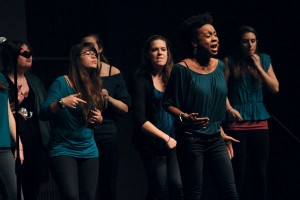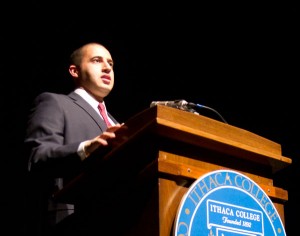To celebrate the life, legacy and contribution of Martin Luther King Jr., Ithaca College is focusing on “a new definition of greatness” to encourage students to live up to their potential for public service.

The week’s theme will be highlighted throughout the remainder of the celebration, which included a keynote speech yesterday from Svante Myrick, Ithaca’s first African-American mayor.
In his speech last night, Myrick focused on the theme of greatness to highlight the broad challenges today’s generation faces.
Myrick said people can do more by working together than independently.
“The reason service is great, the reason serving others is more impactful, is because it will help you help us all accomplish more than we can individually,” he said.
The week’s kickoff event Monday in Emerson Suites launched the celebration and featured a presentation by the college’s first-year MLK scholars, remarks from Jeff Cohen, director of the Park Center for Independent Media and associate professor of journalism, and a welcome address by President Tom Rochon.
In his speech, Rochon talked about the importance of recognizing King’s power as an influential orator, able to move thousands to action by imploring them to recognize their responsibility as public servants.
“This week we examine a different theme in King’s legacy, one that was also consistent with his call for action, to which he dedicated his life,” he said. “It’s the legacy of a servant leadership.”
Touching on his own personal journey, Cohen said King was a guiding light in his life as a young journalist working in Tennessee during a racially contentious period.
“I got thrown into journalism a few years after King was murdered by going to Memphis to investigate and write about his assassination and about the years of FBI harassment that were aimed at Dr. King,” he said. “Many mainstream outlets today don’t tell us the full story. They seem to go out of the way to overlook the last year or so of Dr. King’s life.”
Following Cohen’s introduction, the MLK scholars were featured in a video documenting their experiences on the week-long civil rights tour they took in October from Birmingham, Ala., to Atlanta, Ga. On the trip, they met activists who worked alongside King and learned about key civil rights events.

Freshman Helena Murphy, one of the scholars who went on the trip, said she was shocked when she learned that civil rights leaders and King’s followers were primarily young people.
“A lot of the people that served in the mission were college-aged kids, high school kids and kids in elementary school — they’re the ones that marched,” she said. “I always thought that it was older people, like guys in their 40s and 50s, and it wasn’t. That really touched me because that makes me feel like I can be doing way more than I’m doing right now. I have the power to.”
Echoing the week’s sentiment of service, Murphy also said she believes everyone has the power to enact change by adopting a positive attitude and shifting their notions of social institutions.
“You don’t have to be some great, educated person to change someone’s life, or the way the community runs,” she said. “It’s just serving and thinking up ways to help people get along better and help the community as a whole to work together and change. It’s all about change — transforming the way institutions work.”
Freshman Aaron Lipford, another MLK scholar, said he was grateful for the opportunity to gain a more intimate insight into King’s life and mission and for the chance to be able to share his knowledge with others along with the other scholars.
He also said his experiences during the tour help him remain hopeful for the future because he saw first-hand how much King’s legacy remains with people today.
“People always say, ‘History always repeats itself,’” he said. “Well, history is still happening, and being there showed me that things are changing. But they’re changing with progress because MLK’s mission is still alive.”
Staff Writer Candace King contributed to this article.







